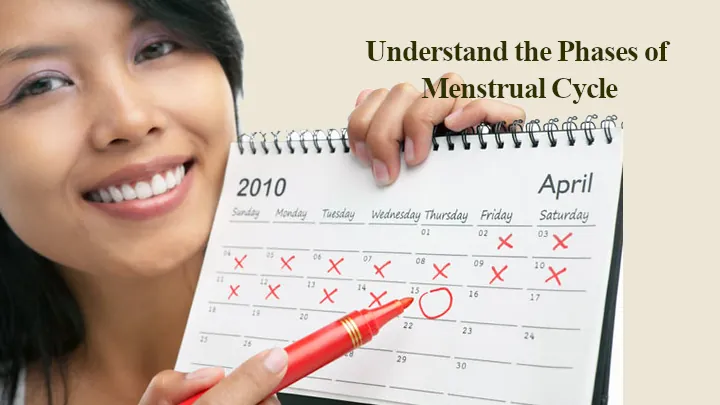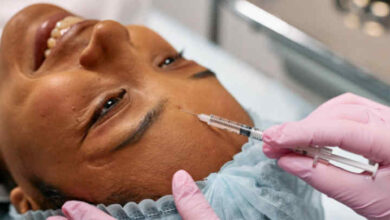Understand the Phases of Menstrual Cycle

At the time of your menstrual cycle, an egg is developed and every month women’s bodies prepare to get pregnant. But when the women do not get pregnant these eggs get released from the ovaries. Due to this, the lining of the uterus builds up due to the egg, but due to not getting pregnant the uterine lining sheds due to which menstruation happens and women get cramps too.
The menstrual cycle is a complex yet vital process in a woman’s reproductive system. And there are 4 Phases of the menstrual cycle which we are going to discuss in this blog.
What are the 4 stages of the menstrual cycle?
1. Menstrual Phase (Days 1-5)
The menstrual phase begins at the beginning of menstruation. They are characterized by the shedding of the uterine lining. Women experience symptoms like abdominal cramps, lower back pain, fatigue, and mood swings during this phase.
Managing period pain is essential for comfort and well-being. This phase begins when the egg from the previous cycle is not fertilized and the body does not find any symptoms of pregnancy due to which there is a drop in the levels of hormones called estrogen and progesterone.
Symptoms of the Menstrual Phase
- Menstrual Bleeding: Shedding of the uterine lining, resulting in vaginal bleeding are the most common symptoms you may recognize.
- Period Cramps: Mild to severe pain in the lower abdomen which is termed dysmenorrhea or period pain. If you are PMSing and there is a hormonal imbalance then the pain can be intense. Try to use home remedies for period pain, if you are okay with medications then take it but under professional advice. You must also try period pain relief gadgets that can help to alleviate period pain naturally. There is also herbal tea made from the concept of Ayurveda, you can consume the same for better results.
- Fatigue: Feeling tired or lethargic due to hormonal changes.
- Mood Swings: Emotional changes due to hormonal fluctuations.
- Headaches: Some women experience headaches during this phase.
Follicular Phase (Days 1-13)
The follicular phase also initiates with menstruation, so there is some overlap with the first stage which is the menstrual phase. Here, the hormone levels trigger the development of follicles in the ovaries. As estrogen rises, it prepares the body for ovulation.
Symptoms of Follicular Phase
- Lighter Bleeding or Spotting: Reduced menstrual flow as the uterine lining begins to regenerate.
- Increased Energy: At this time there is a rise in the estrogen levels that may boost energy levels.
- Improved Mood: The effect of estrogen may impact your body which may lead to a more positive mood.
- Changes in Libido: Some women may experience an increase in sex drive.
- Ovulation Pain: In some cases, mild discomfort or pain around the time of ovulation.
Ovulatory Phase (Day 14)
Ovulation occurs during this phase, marking the release of the egg from the ovary. The egg conducts a way to travel down the fallopian tube toward the uterus in order to be fertilized by the sperm.
This phase is the time when it is clear that you cannot be pregnant. Thus, understanding this phase helps you to identify the fertility window, aiding in family planning or conception efforts.
Symptoms of Ovulation Phase
- Changes in Cervical Mucus: It is a kind of fluid produced by the cervix and this mucus changes throughout your menstrual cycle. Thus it may be possible that it turns out to be wet and slippery which indicates fertility and makes it easier for sperm to swim to an egg at ovulation
- Increase in Basal Body Temperature: A slight rise in body temperature due to hormonal changes.
- Mild Spotting: Some women may experience light spotting during ovulation.
- Breast Tenderness: Sensitivity or soreness in the breasts.
- Increased Libido: Heightened sex drive during this fertile phase.
Luteal Phase (Days 15-28)
When the egg is Post-ovulation, the luteal phase begins, characterized by increased progesterone levels. The body prepares the uterus for potential implantation, and symptoms like breast tenderness or bloating may arise.
Symptoms of the Luteal Phase
- Breast Tenderness: Continuing or worsening sensitivity in the breasts.
- Bloating: Feeling of abdominal fullness or bloating.
- Mood Swings: Fluctuations in mood, or moods that lead to irritability.
- Food Cravings: Desire for certain foods like sweet or fried food due to hormonal changes which is generally known as period cravings. It is tough to make the right food choices during this period. Try to have good food or some healthy period snacks that do not confuse your hormones.
- Fatigue: Feeling tired or experiencing lower energy levels.
Throughout these phases, you may find period pain varies in intensity. Try to adopt natural methods like heat application, yoga, meditation, getting good sleep, and taking proper rest that can provide relief.
If your pain is intense and you want to go for natural ways that may not include any kind of medications, try to utilize period pain relief devices that use technology like TENS which can significantly alleviate discomfort, and enhance overall well-being during menstruation.
Common Symptoms and Changes Throughout the Cycle
Each phase brings some common symptoms, impacting mood, energy levels, and physical well-being. Understanding these changes empowers women to manage their periods effectively.
Cycle Variations and Irregularities
Irregular menstrual cycles can result from various factors like PCOS, PCOD, ovarian cysts, etc. Knowing when to seek medical advice for persistent irregularities can ensure optimal reproductive health.
Factors Affecting the Menstrual Cycle
Some external factors such as stress, irregular diet, unnecessary food that may cause discomfort to your body and confuse your hormones, or some serious health conditions can influence the menstrual cycle’s regularity. Being aware of such factors and making mindful decisions aids in maintaining a healthy period cycle.
Wrapping Up
Understanding the stages of the menstrual cycle is crucial for women’s health as your body acts differently in every phase. Right knowledge allows better management of these symptoms and can lead to improved physical health as well as mental health during or before menstruation.





